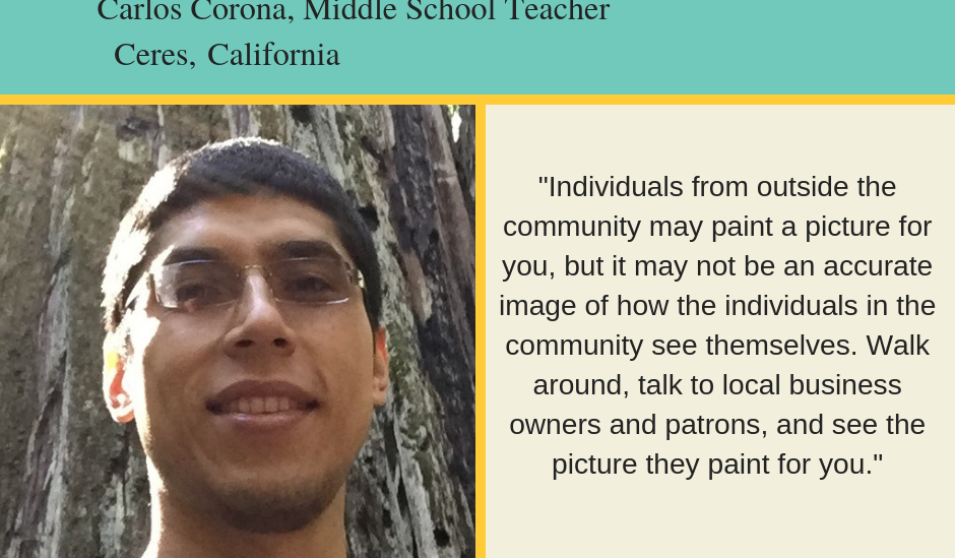Stories matter. It is imperative that we commit to rewriting the rural narrative. We believe that the dreams, ideas, and reflections of rural teachers are great places to start.
Public education is a common element of America's diverse rural regions. Rural schools, which are nothing less than shrines to the common good, have the power to change communities, connect advocates, and engage passionate young people in leadership roles. Of course, the former will depend largely on the latter.
Preparing, recruiting, and supporting young teacher-leaders is of the utmost importance. In fact, the Rural Schools Collaborative suggests that public schools may be the best vehicle available to attract intellectual capital to our rural regions and small towns. This is why we remain bullish on the rural teacher corps concept and our I am A Rural Teacher initiative.
It is in this spirit that we launched a new series, First-Year Focus: Rural Teacher Reflections. Three weeks ago, we featured Blane Redus, a fourth grade teacher in Miller, Missouri. This week, we are featuring Carlos Corona, a middle school teacher in Ceres, California. Carlos graduated last year from California State University, Chico, one of our Northern California Hub partners.
Carlos' Story
Unless you know the Northern Sacramento Valley, chances are you've never heard of my hometown. My hometown is Arbuckle, which is centrally located around California’s almond orchards and rice fields. Arbuckle is a rural community with roughly 5,000 residents calling the area home. As many expect, there are no traffic lights in the town and the businesses in the area are locally owned.
I believe my school experience indirectly influenced me to go into teaching. Never in my K-12 experience did anyone suggest a profession in teaching. There was great support in a higher education, but not necessarily teaching. The expectation was to graduate, move to a large city for the college experience, and attain a high-paying job to avoid returning to the rural lifestyle. For that reason, I was never directly influenced to go into teaching. Instead, my positive experiences with my own teachers motivated me to enter teaching. It was their professional support and positivity that encouraged me to become an educator.
My first-year teaching involves teaching a semester-long course of Introduction to Manufacturing at Mae Hensley Junior High. I find this exciting because it is an area I have personal experience with, but zero idea how to teach these concepts to middle school students. My students love technology, video games, and 3D printing, so gaining student buy-in is not difficult. What I find challenging and exciting is introducing the ideas of robotics, coding, and team building in ways my students can understand.
A common stigma I have heard often is that students from rural and high poverty areas do not respect any form of authority. My experiences have shown me otherwise. As middle school students, they are highly social and, at times, impulsive with their decisions. Whether they are upset, frustrated, or angry, their reactions are never directed towards me. They understand the choices made were not in their best interest, but they never directly target me in any hostile manner. If anything, they almost appreciate the structure provided in the classroom.
I feel as I am a part of the school community. Roughly half of the 30 something staff at my school are new. The culture is redeveloping, and I believe it to be a positive culture. Veteran staff check in on new staff, professional learning communities include subject-like common preps where teachers share instructional and assessment practices, and there is open communication with administration.
In terms of the community as a whole, I feel a disconnect with some members. The school population is roughly 87% Latino and the city is 56% Latino. Even though these numbers reflect my own demographic, I do not feel I relate to the issues plaguing many student households. Drugs, gangs, and other domestic issues are issues I never had to face as a child, so I do feel ill-prepared to address those ideas. I do empathize with students and have made an effort to learn more about what resources are in the community.
Before teaching at my middle school, I did a community study on the neighborhood of the school and the city. What I came to learn was that the culture of the community is shifting to be a more positive environment for students and families. Law enforcement, education institutions, and community members are trying to change the stereotypes of the city as being filled with drugs and gangs. Services are offered in the community for families struggling with poverty and drugs, and the local community center works with families in obtaining employment. All in all, the city is doing its best to change the negative reputation it was given.
I would advise a future rural teacher to spend some time in the community and school they plan to serve. Individuals from outside the community may paint a picture for you, but it may not be an accurate image of how the individuals in the community see themselves. Walk around, talk to local business owners and patrons, and see the picture they paint for you. I received a more accurate, positive, and helpful lens of the community from long-time residents that helped me enter the classroom with a positive state-of-mind.
Stay tuned for the next story in our First-Year Focus: Rural Teacher Reflections. Also, we invite you to learn more about the emerging Rural Teacher Corps network.




